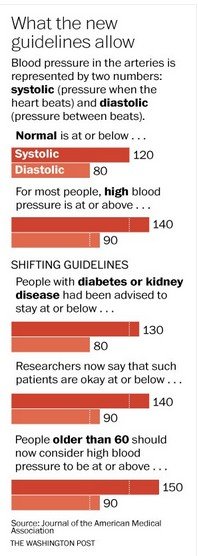The subject will hit the health news today...
A new study questioning the current blood pressure guidelines, especially for older persons and people with diabetes or kidney disease.
It could lead to a mini revolution in the pharmaceutical and medical profession, and initiate the kind of controversy that theories on diet have generated in the recent past, or the more recent study the on the value of vitamins.
Being in the "older class" the thought that artificially low BP readings are always good... may have to change. Is low blood pressure possibly harming the system? Stay tuned....
New blood-pressure guidelines raise concern among heart-health groups - The Washington Post
A new study questioning the current blood pressure guidelines, especially for older persons and people with diabetes or kidney disease.
It could lead to a mini revolution in the pharmaceutical and medical profession, and initiate the kind of controversy that theories on diet have generated in the recent past, or the more recent study the on the value of vitamins.
Being in the "older class" the thought that artificially low BP readings are always good... may have to change. Is low blood pressure possibly harming the system? Stay tuned....
New blood-pressure guidelines raise concern among heart-health groups - The Washington Post
Whaddya think?Raymond R. Townsend, a kidney specialist at the University of Pennsylvania who helped write the new guidelines, said the group’s work is based on the best available evidence from high-quality clinical trials. Published last week in the Journal of the American Medical Association, the recommendations allow people over 60 and those with diabetes and kidney disease to have slightly higher blood pressure than current standards, a change that could mean having to take fewer pills.
... more...
Attachments
Last edited:

